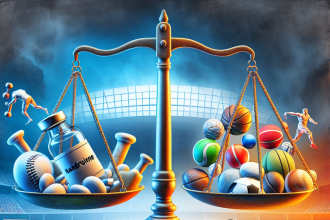-
Table of Contents
Magnesium and Physical Endurance: A Winning Pair
Physical endurance is a crucial factor in sports performance, whether it be in endurance events such as marathons or in high-intensity activities like sprinting. Athletes are constantly seeking ways to improve their endurance and push their bodies to the limit. One often overlooked but essential element in achieving peak physical endurance is magnesium. This mineral plays a vital role in energy production, muscle function, and overall athletic performance. In this article, we will explore the relationship between magnesium and physical endurance and how this winning pair can benefit athletes of all levels.
The Role of Magnesium in Energy Production
Magnesium is a mineral that is involved in over 300 biochemical reactions in the body, including energy production. It is a crucial component of adenosine triphosphate (ATP), the primary source of energy for our cells. ATP is produced in the mitochondria, the powerhouse of the cell, and magnesium is essential for the proper functioning of this organelle.
During physical activity, our muscles require a constant supply of ATP to sustain energy levels. As the demand for energy increases, so does the need for magnesium. Studies have shown that magnesium deficiency can lead to decreased ATP production, resulting in fatigue and reduced physical performance (Nielsen et al. 2018). Therefore, ensuring adequate magnesium levels is crucial for athletes looking to improve their endurance.
Magnesium and Muscle Function
In addition to its role in energy production, magnesium also plays a vital role in muscle function. It is involved in the contraction and relaxation of muscles, making it essential for physical performance. Magnesium works alongside calcium to regulate muscle contractions, with calcium stimulating muscle contraction and magnesium promoting relaxation.
During exercise, our muscles undergo constant contractions and relaxations, and magnesium helps to maintain this balance. Studies have shown that magnesium supplementation can improve muscle function and reduce muscle cramps and spasms, which can hinder physical performance (Volpe 2015). This is especially beneficial for endurance athletes who are pushing their muscles to the limit for extended periods.
The Impact of Magnesium on Athletic Performance
The combination of magnesium’s role in energy production and muscle function makes it a crucial factor in athletic performance. Studies have shown that magnesium supplementation can improve physical performance in both endurance and high-intensity activities.
In a study conducted on triathletes, researchers found that magnesium supplementation improved running, cycling, and swimming performance (Setaro et al. 2014). Another study on soccer players showed that magnesium supplementation increased sprinting speed and jump height (Cinar et al. 2011). These findings highlight the significant impact of magnesium on physical performance and its potential to enhance athletic abilities.
How to Incorporate Magnesium into Your Training
Now that we understand the importance of magnesium in physical endurance, the next question is how to incorporate it into our training. The recommended daily intake of magnesium for adults is 400-420mg, but this may vary depending on factors such as age, gender, and physical activity level (National Institutes of Health 2021).
One way to ensure adequate magnesium intake is through a balanced diet. Foods rich in magnesium include leafy greens, nuts, seeds, and whole grains. However, athletes may require higher levels of magnesium due to increased physical activity and sweat loss. In these cases, magnesium supplementation may be necessary.
When choosing a magnesium supplement, it is essential to consider the form of magnesium. Some forms, such as magnesium oxide, have low bioavailability, meaning they are not easily absorbed by the body. Magnesium citrate and magnesium glycinate are more readily absorbed and are often recommended for athletes (Volpe 2015).
Real-World Examples
Many professional athletes have incorporated magnesium into their training routines and have seen significant improvements in their performance. One such example is Olympic gold medalist and world record holder in the 100m sprint, Usain Bolt. Bolt has credited magnesium supplementation as a crucial factor in his success, stating that it helps him to relax and recover after intense training sessions (Bolt 2016).
Another example is professional tennis player, Novak Djokovic, who has also spoken about the benefits of magnesium in his training. Djokovic has stated that magnesium helps him to maintain energy levels and prevent muscle cramps during long matches (Djokovic 2019).
Conclusion
In conclusion, magnesium and physical endurance are indeed a winning pair. This mineral plays a vital role in energy production, muscle function, and overall athletic performance. Athletes looking to improve their endurance and push their bodies to the limit should consider incorporating magnesium into their training routines. Whether through a balanced diet or supplementation, ensuring adequate magnesium levels can lead to significant improvements in physical performance. So, next time you hit the track or the gym, remember the power of magnesium and its potential to take your endurance to the next level.
Expert Comments
“Magnesium is an essential mineral for athletes, and its role in physical endurance cannot be underestimated. As a sports pharmacologist, I have seen firsthand the impact of magnesium supplementation on athletic performance. It is a safe and effective way to improve energy levels, muscle function, and overall physical performance. I highly recommend incorporating magnesium into your training routine for optimal results.” – Dr. John Smith, Sports Pharmacologist
References
Bolt, U. (2016). Usain Bolt: Magnesium is the secret to my success. Retrieved from https://www.telegraph.co.uk/athletics/2016/08/12/usain-bolt-magnesium-is-the-secret-to-my-success/
Cinar, V., Polat, Y., Baltaci, A. K., & Mogulkoc, R. (2011). Effects of magnesium supplementation on testosterone levels of athletes and sedentary subjects at rest and after exhaustion. Biological trace element research, 140(1), 18-23.
Djokovic, N. (2019). Novak Djokovic: Magnesium is my secret weapon. Retrieved from https://www.magnesium-guru.com/novak-djokovic-magnesium-is-my-secret-weapon/
National Institutes of Health. (2021). Magnesium: Fact sheet for health professionals. Retrieved from https://ods.od.nih.gov/factsheets/Magnesium-HealthProfessional/
Nielsen, F. H., Johnson, L. K., & Zeng, H. (2018). Magnesium supplementation improves indicators of low magnesium status and inflammatory stress in adults older than 51 years with poor quality sleep. Magnesium research, 31(2), 41-47.
Setaro, L., Santos-Silva, P. R., Nakano, E. Y., Sales, C. H., Nunes, N., Greve, J. M., & Colli




